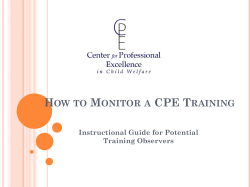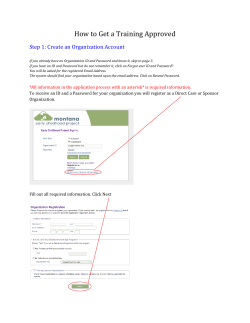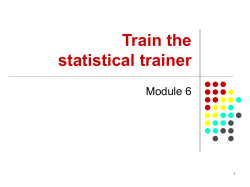
Teacher Training 2013 HOW TO BE A TEACHER TRAINER Course Dates:
Teacher Training 2013 HOW TO BE A TEACHER TRAINER Course Dates: 4 August – 17 August 2013 Course Location: Course Fees: The University of Kent £1,060 Course Codes: THT32 2 week Target audience • Native speakers and non-native speakers with an upper-intermediate ( B2) and above level of English • Experienced language teachers who want to become teacher trainers or mentors • Those new to teacher training, including directors of studies, who want to develop their skills further Course summary The course focuses on ways of helping and training teachers. The content will be practically orientated. You will examine the major differences between language teaching and teacher training, investigate different ways of planning and presenting sessions and enhance your "people skills." By the end of the course you will have covered those key areas necessary to feel more confident either to take up a training position or to develop further in your current role. Materials will be partly customised for the group by the main trainer, supplemented by published materials. The trainer will hold a "needs and wants" session on the first day to ensure the group has a central part to play in negotiating course content. You will become familiar with on-line resources like HLTmag and the Teacher Trainer Journal. Programme of the training activities • Plan training sessions that value different learning styles • Heighten your observation skills and provide valuable feedback on teaching • Acknowledge and respond to feedback given to you by others • Listen to people respectfully and communicate sensitively and effectively • Deal with "difficult people" • Relate to and manage teachers on an individual and team basis • Develop teacher autonomy which encourages continuous, self-determined professional development • Maintain and expand your own development as a trainer • Incorporate core elements from "feeder fields," such as NLP, into your training • Become familiar with TT resources like British Council webinars, SEETA, IATEFL on-line • Tools of professional development including publishing in journals and on-line magazines Description of training content: Preparation Each applicant to send in action plan 4 weeks before the course outlining hopes and objectives for achievement as a result of attending this course. Objectives The course aims to provide an analysis of key issues related to Teacher Training and Teacher Development. Expected results As a result of attending this course, the participants will develop the expertise and the skills to design and run their own Teacher Training/Teacher Development sessions. Is this the right course for me? • Yes, if you want to become a teacher trainer or a mentor • Yes, if you have recently become a teacher trainer, senior teacher or a director of studies and wish to develop your skills further and become more confident in your role If this is not the right course for you, please consider the following: • NLP for Teachers if you are interested in exploring NLP and learning styles in more depth • Creative Methodology for the Classroom if your needs and interests relate more generally to methodology in the classroom • Teacher as Leader and Coaching for Teachers if you want to perfect your interpersonal trainer skills Programme of the training activities day by day: Please note this is an example of a daily programme. Course content may often be usefully adapted to incorporate the needs of each specific group. Week 1 Monday Introductions and group bonding. Ice breakers and group formation activities Tuesday From language teacher to teacher trainer Similarities and differences Wednesday Planning effective training sessions. The key ingredients Thursday What comprises effective feedback. Different approaches to spoken feedback Friday Teaching beliefs and values and their potential impact on training styles 11.00– 12.30 Needs analysis and goal setting Identifying current teaching strengths that will help when training teachers The qualities of a good teacher trainer identified and discussed Strategies for building and maintaining healthy group dynamics (Homework: Planning for micro teaching) Observation skills. Commentary and evaluation. Written feedback. (From a videoed lesson) Comparing written feedback from morning session. Analysis of language used Lecturer, facilitator and animator roles PM 14.0015.30 Workshop. Micro teaching in groups. Giving and receiving feedback Reflection on responses to feedback on micro teaching. Affective responses AM 9.00– 10.30 Review of week one, including feedback and goal setting for week two Week 2 AM 9.00– 10.30 Monday Planning training sessions. Loop input 11.00– 12.30 Learning styles. An overview PM 14.0015.30 How to cater for various learning styles Tuesday NLP in teacher training. Some practical applications Different training contexts. Pre service and in service teacher training Wednesday Mentoring approaches and techniques Thursday When it all goes wrong. Giving difficult feedback Friday Co counselling as a strategy for self management Maintaining trainee and trainer motivation Reconstructing a “disastrous lesson” Active listening skills to help build rapport Effective tutorials and goal setting Dealing with “difficult people” Strategies for post course development. Ways into training through peer observation and teacher discussion groups Course review, including feedback and farewells Recommended reading: “Tasks for Language Teachers” M. Parrott (CUP) 1993 “Tasks for Teacher Education” R. Tanner & C. Green (Longman) 1998 “Models and Metaphors in Language Teaching” T. Woodward (CUP) 1991 “ Ways of Working with Teachers” T. Woodward (Tessa Woodward Publications) 2004 Archive of The Teacher Trainer Journal at http://www.tttjournal.co.uk/index.php?page=archive Humanising Language Teaching Magazine at www.hltmag.co.uk Please note it is not necessary to buy these books or bring them to the course with you Type of certification awarded: Attendance certificate detailing topics covered, course content and the number of training hours. Contact details: Centre Manager: Lizzie Wojtkowska -Wright, Email lizzie@pilgrims.co.uk, Tel 0044 1227 762111, Mob: 0044 774848 7013 4-6 Orange Street, Canterbury, CT1 2JA
© Copyright 2025





















